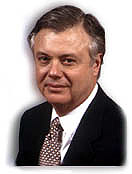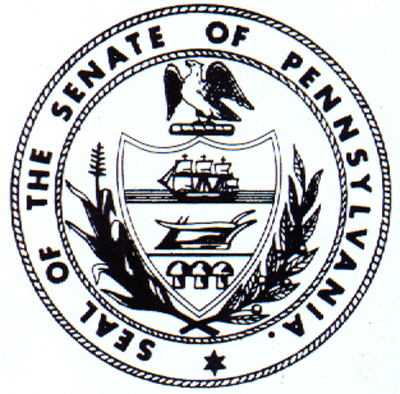|
|
||||||
FUMO AIDE DISCUSSES SLOTS AT NATIONAL RACINO
CONFERENCE HARRISBURG, November 11, 2003 – Pennsylvania will legalize slot machine gambling only with strict state regulatory controls, and only if slot machines are permitted at some non-racetrack locations, a staff member for state Senator Vincent J. Fumo (D-Philadelphia) predicted today. Christopher Craig, legal counsel for Fumo, appeared as a panelist discussing the growth of slot machine gambling at Racino 2003, a national gaming conference taking place at Mountaineer Racetrack and Gaming Resort in Chester, West Virginia. The conference began yesterday and concludes tomorrow. Fumo was among the chief architects of a slots bill that passed the state Senate in June with 27 affirmative votes – 21 of them from Senate Democrats. The bill was amended in the House of Representatives and has been stalled since. Craig told the conference there is a 50-50 chance that Pennsylvania will approve slots this year. A copy of his opening remarks on the panel are attached. # Attachment Remarks of Christopher B. Craig, Counsel, Senate Democratic Appropriations on behalf of Pennsylvania Senator Vincent J. Fumo. Thank you for the opportunity to appear on behalf of Senator Vincent J. Fumo. Senator Fumo has been one of the principle members of the Pennsylvania General Assembly involved in developing legislation to authorize the operation of slot machines in the Commonwealth. As it currently stands, it is no better than a 50-50 chance that the legislature will pass a slots bill this year. Importantly, the chance of success depends greatly on the willingness of each current track operator and other industry participants to accept two significant precepts -- first, in order to generate the amount of revenue needed to provide local property tax relief, slot operations must be placed at non-track venues, and second, strong state regulatory control over slot operations is essential to good public policy. The operation of a slot machine in Pennsylvania is currently a crime, punishable by a maximum five-year prison term – if it is going to be legalized, then it must be done in a manner that ensures public confidence in the integrity of their operation and the reliability of the slot-tax revenue to support needed property tax relief. Thus far, two differing versions of a slots bill have passed each chamber of the legislature. Although each bill would authorize the operation of slots machines in the state, the bills represent divergent concepts of how such operations are to be conducted and how licenses to operate slot machines are to be issued. Since July, there has been no legislative progress on any bill; however, there has been a significant amount of progress toward understanding the issue, identifying the objectives to be achieved in a bill, and in crafting a new bill that balances the business needs of slot operators and the public policy objectives of the Commonwealth. Our office quickly realized that we needed to do additional work, so we did some research and hired a well respected gaming consulting firm to conduct a statewide market analysis. This accomplished a few important things – first, it helped us identify the quality of different gaming markets in the Commonwealth, and recognize market saturation points; second, it helped us gain a better understand the value of different potential slot venues and financing / development costs. In addition, we retained a prominent gaming law firm to help us better craft the regulatory structure needed to ensure state control over the revenue stream, slot operations and license allocation. To the best of my knowledge, no other legislative or administrative office has conducted this type of detailed analysis of this issue. The primary political force behind the movement of a slot bill in Pennsylvania is the desire for a source of revenue to provide meaningful local property tax reduction. This need has been identified as $1 billion annually for a sufficient amount of tax relief statewide – meaning that the revenue stream must be sustainable at that level. This goal cannot be met by placing slot operations exclusively at horse racing tracks. Not only would that leave significant markets untouched in the Commonwealth, but it simply would not gain the consensus of votes from legislators who conceptually support legalization of slots, but would like to see their district remain eligible to have a slot operation. There are currently only four race tracks in operation in Pennsylvania – two others have received licenses this past year but cannot get the financing necessary to build their operations until a slot bill passes. Six tracks in Pennsylvania represents a 50% growth in the horse racing industry. Currently, there are more than 14 different horse track license applications pending for two remaining track licenses. If both were approved, Pennsylvania could have the highest person-per-horse track ratio in the nation and still not provide $1 billion need for property tax relief. No public interest is served by artificially limiting slot operations to race tracks – it removes the flexibility for locating slot venues, it undermines the viability of the horse racing industry by introducing an artificially high level of horse racing competition, and it would risk the viability of the revenue stream for property tax relief. And most importantly – such a scheme cannot pass the legislature. Slots limited to tracks is neither economically nor politically feasible. Equally important is the need for the Commonwealth to tightly control the licensing and operation of slots in the state. Licensing fees, tax structures, a ban on campaign contributions, a central control computer system, a prohibition against license transfers and portability, requiring slot operators to post a bond, and careful licensing review are all elements of a comprehensive bill that our caucus has steadfastly supported. These provisions have been enacted in some form or another in many other jurisdictions. If we are going to create this substantial business opportunity in Pennsylvania, these are minimal concessions that should be made to ensure integrity of the business operations. There are many examples in other states that serve as important lessons which caution against enacting any weak statutory framework for gaming. Prudence dictates a strong regulatory framework. It is our intention to work with every member of the legislature to address their concerns and needs to gain their support for the bill. It is very easy for a small number of legislators to group together to block a bill – only a bill that is written to appeal to a broad consensus will stand any chance of passing. Quite simply -- either everyone benefits from the bill, or no one will benefit. We have recognized this important fact by redrafting a new bill that provides substantial business value to each of the track licensees in Pennsylvania – guaranteeing their tax stability, capping the total number of licenses to ensure market predictability, providing statutory limitation as to where slot venues may be place to ensure their market exclusivity, increasing percentage of gross terminal revenue operations can keep, and providing exclusive eligibility to receive a slot license. We hope to begin to share our understanding of the Pennsylvania gaming market and the outline of our legislative proposal with each of the track operators in the near future. We remain concerned. The future likelihood of slots becoming legal in Pennsylvania depends on how quickly track operators embrace strict state regulatory oversight and the placement of some additional slot operations at strategic locations other than racetracks. The essential element needed to increase the chances of a slot bill passing is for all track operators and industry stakeholders to accept these parameters and work cooperatively toward this goal. |


